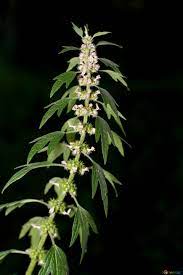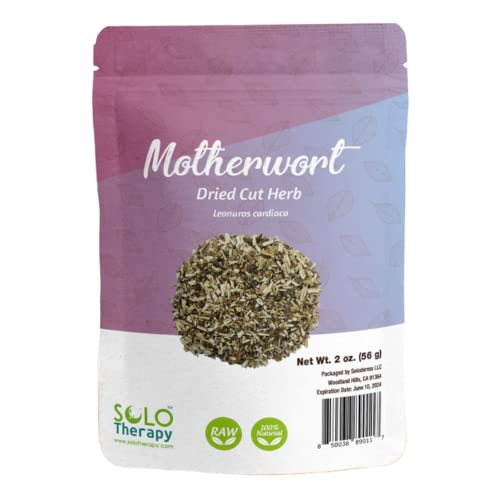Herbal Remedy for Postpartum Depression and More: Leonurus cardiaca / Motherwort and Leonurus japonica / Chinese Motherwort
Motherwort, also known as Leonurus cardiaca or Chinese motherwort, known also as Leonurus japonica are not commonly used during pregnancy, but they are often used in childbirth and during the postpartum period. Motherwort synergizes with oxytocin and can be taken to stimulate labor. It is often used at the end of labor to expel the placenta from the womb. Warnings regarding the use of Leonurus cardiaca come from the fact that motherwort increases contractions during labor. Despite this, the German Commission E has advised that there are not contraindications to the use of motherwort during pregnancy. After all, motherwort has been used by pregnancy women for centuries. An herbal tea or infusion made from Leonurus cardiaca is the best way to administer it during gestation however, because motherwort promotes uterine contractions we recommend that it should generally be avoided until childbirth and the postpartum period. In eastern China, for example, women drink a syrup made with motherwort to help the uterus recover following childbirth. That being said, this is a pregnancy-friendly herb that must be used with great care during pregnancy. It should not generally be administered long-term and I would say, it should be avoided unless the potential benefits of using it outweigh the potential costs. A knowledgeable herbalist of experienced midwife might be able to prescribe this herb to expectant mothers without issue. Exercise caution in using motherwort to self-doctor at home during pregnancy if you don’t have guidance regarding how to use this herb. Its Latin name, Leonurus means “of a lion” and cardiaca means “heart” or “lion-hearted”. This plant works not just on the physical body, but also the emotional and spiritual bodies as well. It is especially famous for helping women connect their root chakra to their heart chakra to reduce tension and anxiety that can cause reproductive organ issues. As such, it is particularly well-suited as an herbal remedy for postpartum depression that is brought on by anxiety or stress due to circumstances surrounding the pregnancy (e.g. an unsupportive partner, an unwanted pregnancy). Motherwort should not be used during the first trimester of pregnancy and after that, it should only be used with guidance from a knowledgeable herbalist. During the initial stages of pregnancy, motherwort can be toxic to a newly formed embryo.Motherwort Essential Oil: Toxicity During Pregnancy
Studies have shown that even small amounts of Leonurus japonicus / Chinese motherwort, is toxic to embryos in animal models. This was an unexpected finding as scientists who observed that Leonurus japonicus was toxic to embryos were studying motherwort-induced angiogenesis. While angiogenesis is important during the early stages of embryo development, apparently, Chinese motherwort essential oil is toxic to embryos even in very small amounts.Motherwort Medicinal Effects
Motherwort has an amazing effect on mood during and after pregnancy. It works through a different mechanism of action than other mood-altering herbs.- Sedative
- Bitter
- Antispasmodic
- Cardiac tonic
- Hypotensive / Lowers Blood Pressure
- Reduces nervous tension
- Eases palpitations from anxiety
- Balances Hormones
- Anti-thyroid
- Gentle emmenagogue / promotes blood flow to the uterus and pelvis
- Uterine tonic
- Uterine sedative
- Reduces pelvic irritability
- Useful for threatened miscarriage
- Hypertonic for certain states of labor
- Treatment for restless legs during pregnancy
- Heals and supports the mother-child relationship
- Improves liver health
- Improves heart health
Motherwort for Adenomyosis
Chinese motherwort (Leonurus japonica) has the ability to reduce pain and also reduce the myometrial infiltration of adenomyosis according to some studies.Motherwort for Postpartum Hemorrhage
The substance stachydrine found in Leonurus japonica / Chinese motherwort, has been used in the treatment of postpartum hemorrhage to reduce the amount of uterine bleeding in obstetric departments in China. Stachydrine appears to be able to increase uterine contraction amplitude while reducing uterine contraction frequency in guinea pigs. The crude extract of Chinese motherwort is particularly useful in the treatment of postpartum hemorrhage due to uterine inertia.Motherwort for Postpartum Depression
Most mothers experience postpartum depression during the first year of a baby’s life. Often, depression ends within a week or two after the birth, but it can last much longer. Postpartum depression seems to occur as a result of hormonal imbalance mixed with insomnia, low energy levels, restlessness, and frustration due to the huge changes happening in the woman’s life. Many women feel guilty about their postpartum depression, which adds insult to injury. And to make matters even worse, many doctors don’t even look for depression in new mothers who might be reluctant to bring up the topic of postpartum depression.In Canada and other developed nations, at least 25% of women experience postpartum depression. Leonurus cardiaca is an herbal remedy for postpartum depression that can be taken along with Mucuna pruriens, Rhodiola and Ashwagandha to balance hormone levels.
Motherwort for Heart Health During Pregnancy
The German Commission E authorizes the use of motherwort to treat irregular heartbeats and fast heartbeat due to stress and anxiety. In this context, motherwort works by calming down an overactive thyroid gland or hyperthyroidism. Note that during pregnancy, women may have lab results indicating slight hyperthyroidism due to an infection somewhere in the body. For example, a kidney infection can cause the thyroid hormones to be just a bit high. Motherwort can help restore balance when the thyroid gland is overreacting during pregnancy.Note that motherwort should never be combined with other heart medications.
Leonurine is a substance found in motherwort that is able to prevent atherosclerosis and high cholesterol in animal models demonstrating its general usefulness as a treatment for heart and circulatory disease. Motherwort is able to reduce arterial stiffness, suppress inflammation, and relieve oxidative stress. As an anti-atherosclerotic medicine, Leonurus species may be useful in treating intrauterine growth restriction or preeclampsia though studies have not been done on the use of this herb to treat these pregnancy-related disorders.
Motherwort for Labor Promotion
Leonurine is a compound that’s found in some species of motherwort. This is the substance that has an effect on the uterus. In studies of leonurine, higher doses inhibited contractions while lower doses spurred uterine contractions. The different medicinal effect depending on dose, explains at least to some extent how motherwort can be both a labor-inducing substance as well as a uterine relaxant. Unfortunately, there are no clear guidelines available regarding dosing during pregnancy to ensure that pregnancy mothers can administer this medicine to themselves properly.In studies, motherwort was able to increase the level of estradiol during pregnancy.
Motherwort contains alkaloids that stimulate the release of oxytocin.During the later stages of pregnancy, when Braxton-Hicks contractions get stronger and stronger, Motherwort can be used to quell false labor through its antispasmodic action. But during active labor, Leonurus cardiaca is particularly useful in smoothing erratic contractions or improving the strength of effectiveness of ineffective contractions. In theory, a higher dose of motherwort would be used to treat Braxton-Hicks contractions while lower doses would be used to boost the effectiveness of uterine contractions during labor. In practice though, the proper dose that should be used to relax false labor contractions, would likely depend on the woman’s size and weight and the gestational age of the fetus. This is why motherwort should generally be avoided by women who are not working with an herbalist who is knowledgeable in the use of this herb during pregnancy.
 Herb Pharm Certified Organic Motherwort Liquid Extract for Endocrine System Support - 1 Ounce
Herb Pharm Certified Organic Motherwort Liquid Extract for Endocrine System Support - 1 Ounce
Motherwort as a Cardiotonic
Leonurus cardiaca can be administered to strengthen the heart to lower high blood pressure or to slow a fast-beating heart (tachycardia), especially if anxiety is part of the problem.Motherwort Dosing During Labor
The Commission E in Germany recommends a dose of 4.5 grams daily, but herbalists suggest a range between 2 to 8 grams per day via infusion (or 2-18 mL of tincture). As discussed above, motherwort dosing alters its medicinal effects during pregnancy, so it seems unlikely that the 4.5 gram dose is safe as a a one-size-fits-all kind of scenario that women can use at home. Again, it’s important to work with an herbalist if you decide to use motherwort during pregnancy to find the right dose for the specific health problem being treated.As an herbal remedy for postpartum depression, start with a low to moderate dose (2-4 grams per day) and increase the dose as needed. Administer Leonurus cardiaca or Leonurus japonica in divided doses 3-4 times daily. In other words, administer 0.5 - 1 gram 4 times throughout the day for a grand total of 2 to 4 grams as an initial starting dose. Observe the results and double the dose, if necessary, the achieve the desired effects.
 Click here to subscribe to the Living Database!
Click here to subscribe to the Living Database!
Resources:

 Motherwort is particularly useful as an herbal remedy for postpartum depression or postpartum hemorrhage.
Motherwort is particularly useful as an herbal remedy for postpartum depression or postpartum hemorrhage. BulkSupplements.com Motherwort Extract Powder - Herbal Supplement, from Motherwort Herb, Antioxidants Supplement - 2000mg per Serving, Vegan Supplement (500 Grams - 1.1 lbs)
BulkSupplements.com Motherwort Extract Powder - Herbal Supplement, from Motherwort Herb, Antioxidants Supplement - 2000mg per Serving, Vegan Supplement (500 Grams - 1.1 lbs)
 Motherwort Herb 2 oz, Leonuros cardiaca, Resealable Bag, Motherwort Tea, Dried Cut Herb, Product From Bulgaria
Motherwort Herb 2 oz, Leonuros cardiaca, Resealable Bag, Motherwort Tea, Dried Cut Herb, Product From Bulgaria








